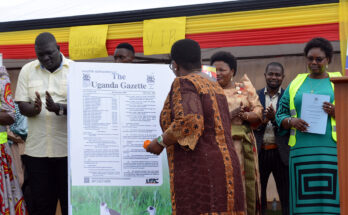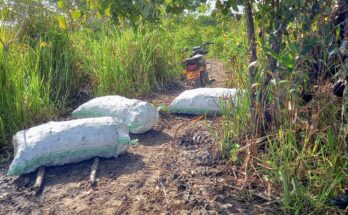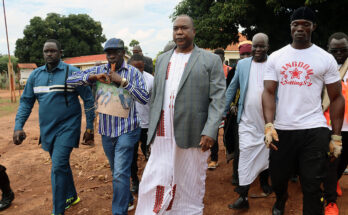PHOTO: Construction Works for the Tilenga Project Industrial Area – Photo by PAU
Floods first swept through Sam Akuguzibwe’s three-acre farm in May last year. Total had been constructing an Industrial Park in his neighbourhood when out of nowhere floods washed away hundreds of acres of farmlands and submerged water sources in Kasenyi village in the Albertine Graben region, west of the country.
At first, Akuguzibwe didn’t want to leave. After all, his family had survived on that piece of land for decades. But when the floods came again and again, the 56-year-old farmer gave up.
“My crops were drowning, and the water kept on bringing more sand and gravel, and my garden, eventually, lost its fertility,” says Akuguzibwe, a father of 10, who eventually abandoned his farm. “Now I farm around my house although the space is small, and I have also been focusing on rearing more chickens and goats”.
Floods have been devastating locals in Kasenyi village since last year. Many farmlands and homes have been devastated and water sources submerged, especially during the rainy season. The overflows have also attracted elephants from the neighbouring Murchison Falls National Park where oil exploration is taking place. The pachyderms often destroy crops and attack the locals.

Joan Bujuni, 25, has been trekking four kilometers daily to fetch water for domestic use because most of the wells around her home have been destroyed by floods. She says that the stagnant water, which came as a result of flooding, has become a breeding ground for mosquitoes. Bujuni is worried that her family might also suffer from water-borne diseases if the floods continue.
“I worry a lot about my children,” says Bujuni, who is also a farmer and a mother of four, “I fear that they might suffer from diseases from using unclean water, or even get attacked by elephants especially when I am away working in the garden”.
Bujuni has also tried to follow on her compensation in vain. Like Akuguzibwe, she has also rented a one-acre piece of land, and she has to trek three kilometers every day to tend to her new garden.
Charles Onencan, a leader of the persons affected by floods who has so far registered 102 affected people in Kasenyi village and Kisomere villages, says they have plans to go to court to seek legal redress over compensation but their efforts are still being slowed by financial constraints.
“The other biggest challenge is getting arrested for protesting for being unpaid because of the current restrictive laws,” he adds.
But locals like Akuguzibwe and Bujuni remain resilient as they look for new ways of adapting to a new life amid the floods. Some are focusing more on rearing animals, home gardening, or renting farms in communities that are flood-free.
“A very big oversight”
When Total began constructing the Industrial park in 2021, large swathes of trees were cleared to pave way for the project. The 700 acre-project, which is a part of the East African Crude Oil Pipeline (EACOP) is expected to have construction camps, a drilling support base and a Central Processing Facility (CPF) that will process a total of 190,000 barrels of crude oil per day, once it is completed. The EACOP project, a 1,443-km crude oil export pipeline that will export Uganda’s to the port of Tanga, will generate 34 million tonnes of carbon dioxide equivalent emissions annually.
Buliisa District Environment Officer, Rogers Tusiime, blames Total for the frequent floods because they “made a very big oversight when they cleared all trees without putting a proper drainage system for water in place”.
“Total never conducted due diligence and their biggest mistake was clearing everything at once, and not in phases,” Tusiime says. “The land was left bare and the floods caught them (Total) unawares”.
Tusiime adds that the problem has also exacerbated food insecurity in the community and some locals are seeking compensation for the damage caused by the floods.
Total denies being responsible for the crisis, saying Buliisa district is “historically prone to floods,” adding that floods were further exacerbated by the above-normal increase in rainfall in the country.
“Since last year we have mobilized intervention aimed at stopping the discharge of water by diverting into stormwater management ponds to help prevent further flow towards the neighbouring community land,” says Total’s Spokesperson, Stephanie Platat, adding that their plans were “disrupted by the increased heavy rainfall”.

Platat also noted that they had compensated the affected locals after conducting assessments in the affected communities. This included 43 affected persons who are living around the Industrial Area; 23 around the Batching Plant Area; and 22 around Gunya 1 well pad.
“As part of our commitment to developing a long-term solution, we contracted a leading Ugandan hydrology consultancy firm – MEIR Engineering & Research – to undertake a hydrological study with the aim of developing a detailed design of a retention pond system,” Platat said.
“The proposed flood mitigation solution includes additional 3 retention ponds at the perimeter of the Industrial Area,” she added that “we have observed the development of manmade trenches leading to newly planted crops and engaged the district leaders and Petroleum Authority of Uganda for further investigation and address with the neighbouring communities”.
But environmentalists remain deeply concerned, especially since a viable solution is yet to be found to curb the floods. In December last year, a group of climate activists were arrested and charged for “inciting violence” in Kampala after they protested to National Environment Management Authority (NEMA) to reevaluate the Environmental and Social Impact Assessment (ESIA) report due to the rampant floods.

In 2020, a group of anti-fossil fuel campaigners dragged the governments of Uganda and Tanzania to the East Africa Court of Justice to stop the EACOP project until the questions of environmental and social justice were addressed. The ruling on the preliminary objection will be handed down when the court sits again in August this year.
“The flooding problem is a clear sign that danger is imminent. Right now livelihoods are being lost and biodiversity being destroyed- and a lot more of these disasters will happen if Total doesn’t stop this bad oil project,” says Dickens Kamugisha, who is the Executive Director of the African Institute for Energy Governance (AFIEGO)
NEMA Deputy Public Relations Officer, Tony Achidria, says the environmental assessment report was “spot on”, adding that Total is using “environmentally-friendly technology” to exploit oil in Uganda.
Planting to control floods
Achidria continued to wax lyrical about the oil exploration in Uganda, stating that the project should be looked at from a “broader perspective” since oil exploration will boost Uganda’s economy and standard of living instead of focusing on the floods.
But the environment office in Buliisa district is worried that more communities will be affected if a solution is not put in place imminently. Officials had previously carried out a re-afforestation programme where 500,000 tree seedlings were to be given to locals to plant around their homes, but inadequate funding has slowed down the initiative.
Studies show that trees help play a significant role in socking up rainwater through infiltration, preventing water run-offs and damage from floods.
Decimon Anywar, an environmental scientist, advises locals to adopt agroforestry best practices by planting both trees and food crops to curb floods. “Farmers also need to adopt ecological practices such as mulching to restore soil fertility,” he says.
For now, as some locals push for compensation, they have tasked Total to construct large water retention dams that can store large volumes of water after flooding which would also be useful for irrigation purposes, especially during dry season.
Akuguzbwe himself has tried to follow up on his compensation but Total says he is not eligible. A local employee at Total, who is part of the compensation team and spoke on condition of anonymity, said an assessment was done and claimants like Akuguzibwe are “speculators who want to make money by pretending to be among those affected”.
But these challenges have not stopped Akugusibwe from fending for his family in the best way he can. On a recent morning, Akuguzibwe woke up very early for garden work. The second planting season was approaching and he needed to clear his rented land in time.
“The oil project continues to bring for us more problems every day,” says Akuguzibwe as his wife and kids were busy feeding the goats.
“But I want this to end. I am ready to do anything for my family to survive. I am willing to sacrifice part of my land so that Total can construct a dam [to stop the floods]. I am ready to do this to protect other gardens”.
Akuguzibwe picked up his hoe and then left.
This story was produced with support from Aga Khan University Climate Change Fellowship 2023.




